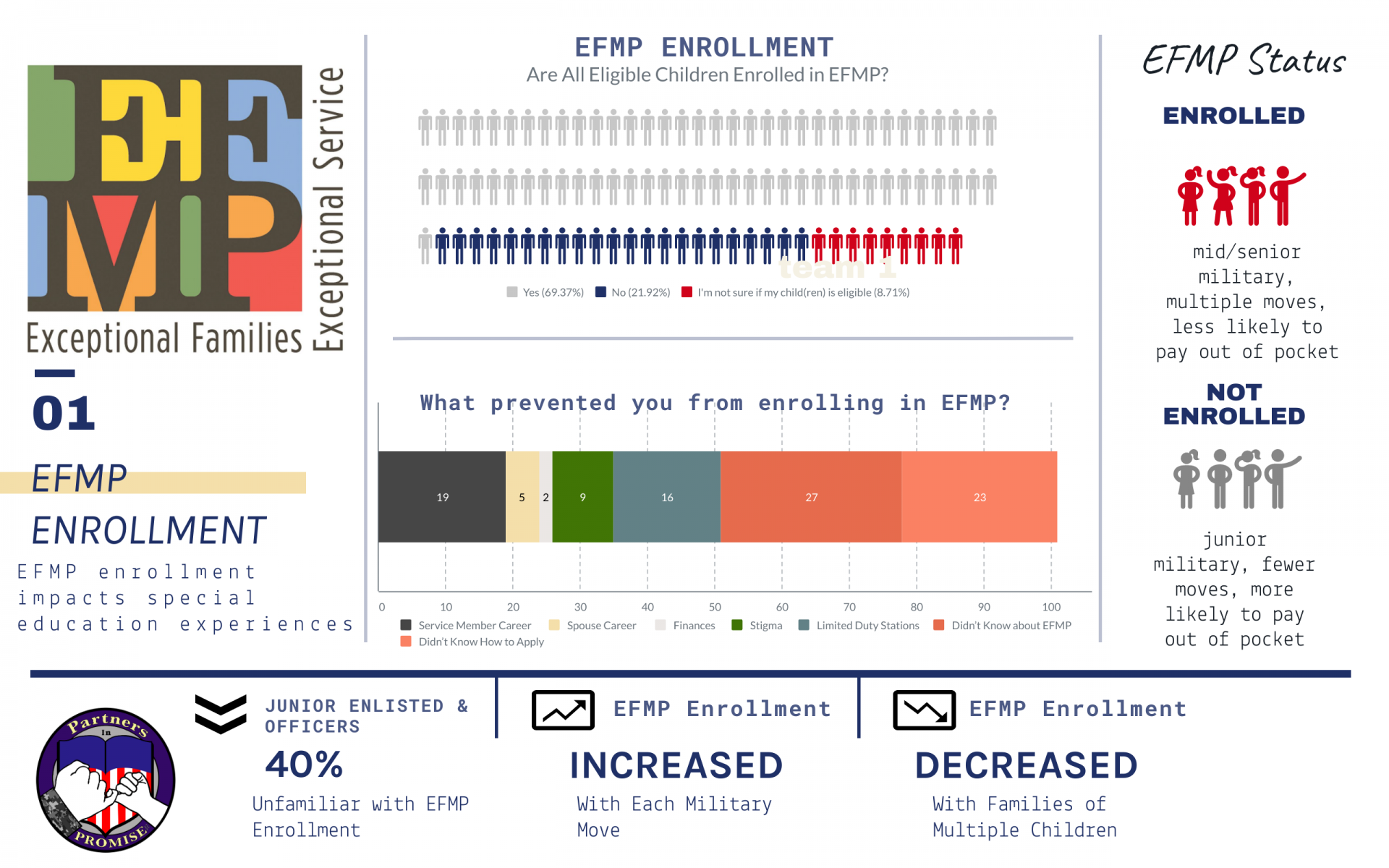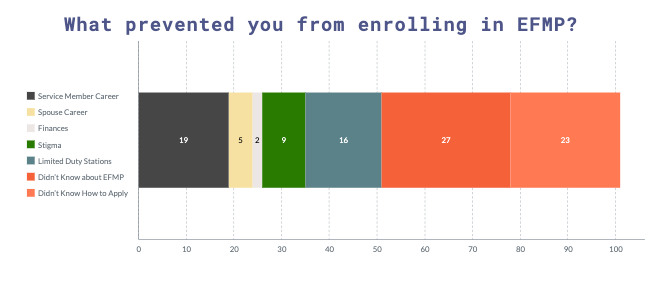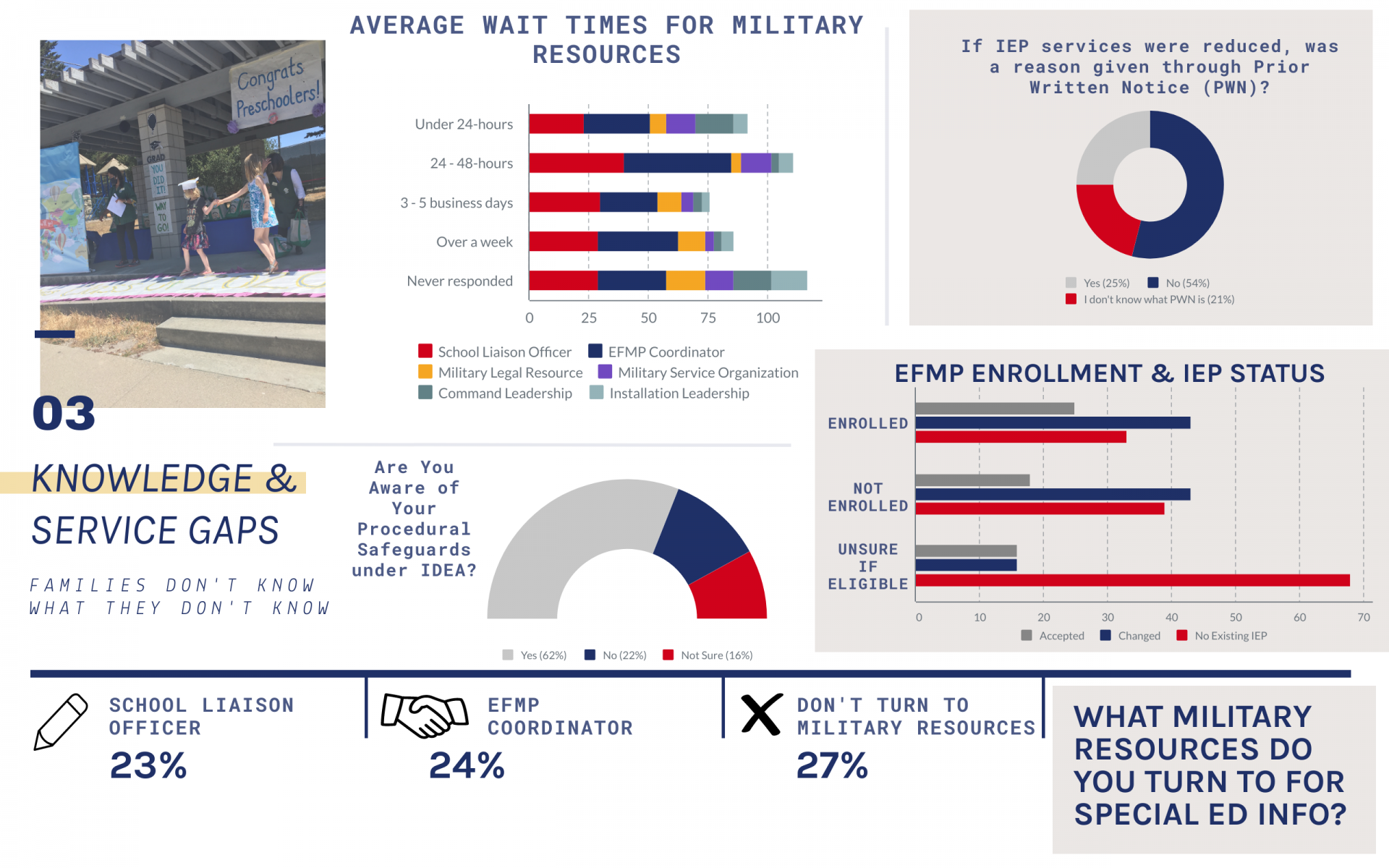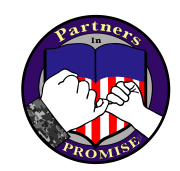Does EFMP Enrollment Make a Difference in Special Education?
| Resources, Survey Data
By Carla Wyrsch
The Exceptional Family Member Program (EFMP) has a simple mission: to ensure that the needs of family members with special medical or educational needs are met. That mission is shaped by three key components which are the building blocks for every EFMP.
- Identification and enrollment of a family member with special medical or education needs;
- Assignment coordination to determine the availability of services at the projected duty station
- To offer support to help families identify and access programs and services.
This service model may work well for some families; however, these same programmatic building blocks are what keep some families with children on IEPs from enrolling in the program.

Partners in PROMISE’s 2021 Military Special Education Survey showed that roughly 22 percent of families choose not to enroll in EFMP with roughly 9 percent unsure if they should enroll. As a special educator and advocate for the EFMP, I reached out to the military community to find out why they chose not to enroll, explain current and future benefits of enrolling, and discuss what is being done to bridge the gap for military children in special education. Here’s what I found out.
Reasons Why Families Choose Not to Enroll.

As a supporter of the EFMP, I was pleased to read in the Military Special Education Survey from Partners in PROMISE that the majority of families who responded chose to enroll their family member in the EFMP. However, while this data was “great news,” I wanted to focus on the remaining 30 percent of respondents and why they chose not to enroll. I dug into the survey results and reached out to friends and I began to understand their hesitation not to enroll a little more.
Their reluctance to enroll revolved around things such as common myths about the EFMP, basing their decision on other’s negative experiences, and to my surprise, generally not knowing how the program could greatly benefit them.
Debunk the Myths Surrounding Enrollment
- It will hurt my servicemember’s career
- It will prevent me from being stationed OCONUS
- It doesn’t really do anything
It is easy to debunk the myths that surround the EFMP because myths are simply stories; widely held but false beliefs. In order to debunk these myths, we simply need to present facts. For example, the Marine Corps devoted an entire study to support that enrollment does not negatively impact a service member’s career progression or ability to promote. The “Analysis of the Impact of Exceptional Family Member Program Enrollment on Individual Marine Career Progression and Promotion” directly supports that not only were enrolled service members staying in the Marine Corps longer, participants of the study (both officer and enlisted) achieved a grade that was higher than or equal to the most likely grade of their matched counterparts.
Furthermore, other initiatives have changed program policies to both ensure care of the exceptional family member and keep the service member’s career at the forefront of assignment coordination. Another common misconception is that the program does not have much to offer children on IEPs. This misconception is greatly rooted in the belief that EFMP focuses less on the education piece because all schools are required to comply with special education law. While students serviced by IEPs are afforded certain rights under federal law, your local EFMP office is required to offer educational supports and services for your family.
Learn from Other’s Negative Experiences
Don’t let one person’s opinion shape your entire experience.
What is proving most difficult in my conversations with friends, is determining how to shift the focus from the negative experiences they or other families have had with the EFMP into a mindset of progression and change. I want to encourage families to use those experiences to create a path forward for their family and other families too.
A few ways to do this is to work with your local EFMP office and create open lines of communication about your expectations and needs. In addition, families should know that their frustrations are being heard on a larger scale and the 2021 defense bill included initiatives designed to standardize EFMP across service branches. Another initiative was the 2018 GAO report on EFMP, which called on the Defense Department to improve its oversight of the program. Partners in PROMISE built on these recommendations by proposing ways to improve the ways EFMP supports military special education families outlined in its 2020 White Paper.
Knowledge Empowers Advocacy

Reaching out, connecting with, and educating families about the benefits of the program should be at the forefront of every installation’s EFMP. However even with this initiative, some families chose not to enroll simply because they did not understand how the program could benefit them; this was a response highlighted in the Partners in PROMISE 2021 survey as well. There are many benefits to enrolling which you can read below; however, one important thing to highlight is you never know when you will need the program. For example, you may not require assistance navigating the special education process while living in Quantico, Virginia, however, when you move to Camp Pendleton, California you are met with pushback from the new school district. Establishing enrollment early on, will assure that you have seamless access to resources during a PCS and at your new duty station.
EFMP Enrollment Special Education Benefits
One key component to family readiness is ensuring our children receive the education and services that are entitled to them. Military families face a unique set of challenges advocating for their children with special needs as a result of numerous moves. Frequently changing schools requires families to develop new relationships with school personnel and navigate the nuances of special education laws and policies at each new duty station. The inconsistency across states and installations in education services and resources, often leads to discontinuity and gaps in special education services.
The EFMP can assist families throughout the PCS process decreasing inconsistencies in services by collaborating with other base resources. The EFMP will work in conjunction with the school liaison (SL) office and the Educational and Developmental Intervention Services (EDIS) program to ensure a sense of ease as families relocate to a new duty station. Even with the best laid plan, transitions may prove to require further assistance advocating for your child’s needs. One key benefit to enrollment in the EFMP is access to a legal assistance attorney which will advocate on your behalf. The Marine Corps was the first service branch to offer special education attorneys to families, however the Navy and Army have both followed suit. The roll out of the Navy’s pilot program comes as Congress looks to mandate the employment of special education attorneys in all service branches. The EFMP attorney offers direct client representation and consultation regarding legal matters such as: special education and 504 related matters, ADA concerns about accessibility and accommodations, guardianship/incompetency, and SSI and Medicaid denials.
Another new initiative and benefit of the EFMP is access to resources such as the Navy’s new EFMP App. Locally, your EFMP office can assist you with educational issues including; setting up an EFMP Special Education Binder or Special Education Checklist, accompanying you to IEP/504 meetings, and connecting you with local resources, support groups, therapies, etc.
EFMP Needs YOU
Even with the most robust marketing and public relations campaigns, sharing your personal experience is the best way to mitigate myths, concerns, and stigma centered around the EFMP and program enrollment. As you explore enrollment in and utilize programs and services offered by the EFMP, share your positive experiences with friends and others in your community. If your experience is not what you had hoped for, share your experience with Partners in PROMISE, your local EFMP or via a system such as the Interactive Customer Evaluation (ICE) so that issues can be resolved.






Leave a Reply